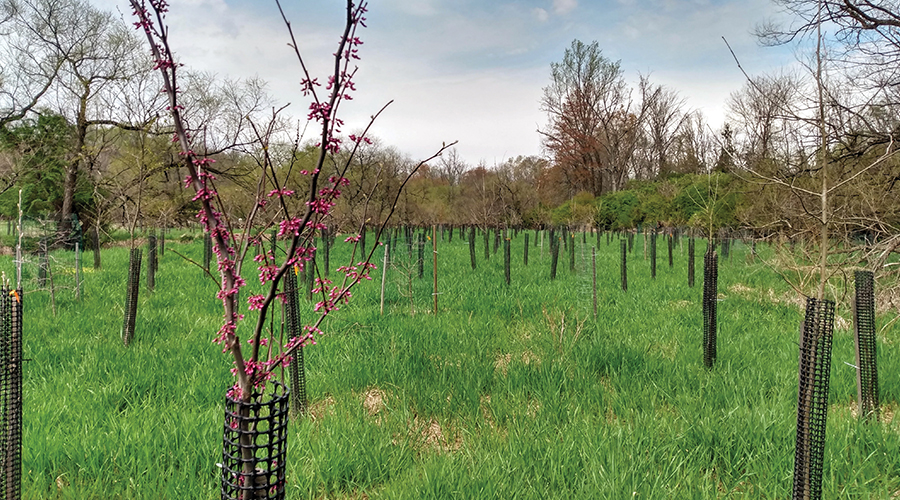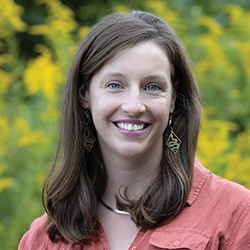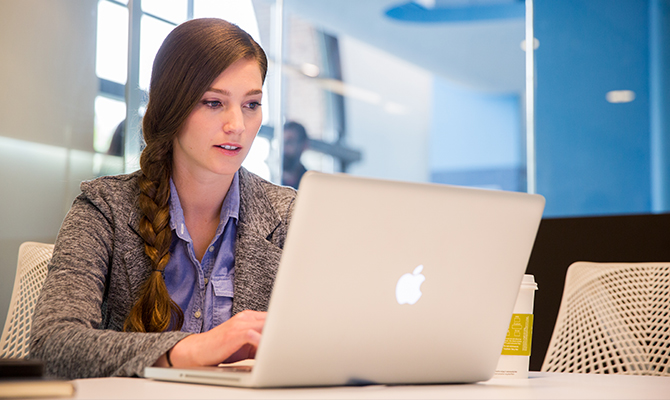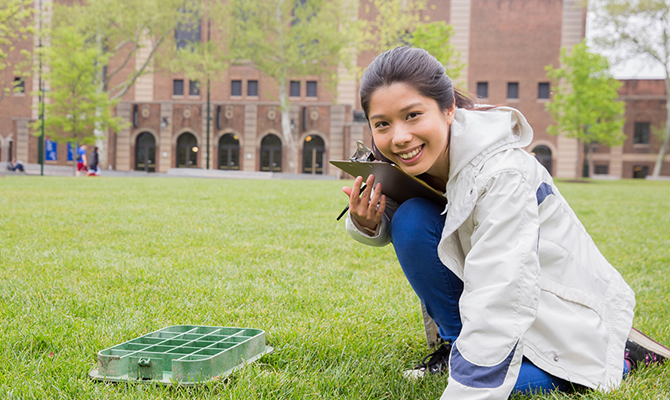
“Our work as conservationists, as researchers, as policy influencers doesn't mean anything unless we can translate our work for a common lay audience,” says Lauren McGrath, freshwater ecologist and instructor of the Master of Environmental Studies (MES) program course Creating Gateways to the Land with Smarter Conservation.
A 2016 alumna of the MES program, Lauren says she landed her dream job at the Willistown Conservation Trust in Newtown Square, PA, shortly after earning her degree. Today, she serves as the organization’s Watershed Protection Program director. Her work at the Trust, she shares, involves assessing how land protection efforts impact the health of waterways. More broadly, her work builds environmental literacy in the community, accomplished through productive communication with stakeholders—experiences she draws on to introduce MES students to the interdisciplinary field of conservation.

“I try to expose students to the many different avenues that they can go down with their Penn graduate degree, shining a light into some obscure corners of conservation,” she says. “The goal is to get these students really thinking about not only what's possible, but what's practical.”
The course covers a new topic or theme each week, such as healthy waterways and caddisflies—which Lauren describes as “the smallest environmental engineers”—or the migration of American eagles. Students analyze readings, participate in research and fieldwork, and hear from a spectrum of environmental experts throughout the semester.
Lauren first joined the course not as the instructor, but as the water ecology guest speaker. She was invited by the previous course instructor Lisa Kiziuk (MES ’04), who works as the director of the bird conservation program at Willistown Conservation Trust. When Lisa was ready to step down as the instructor ahead of the 2022 academic year, she recommended that Lauren take her place. “Lisa said she thought that I took the same kind of interdisciplinary approach to ecology that she had been teaching. Now, we’ve flipped roles, and Lisa gets to guest lecture,” Lauren says, referring to the course’s field trips on bird banding and migration—two favorites among students.
The students in the course, like many in the MES program, tend to have a range of personal and professional backgrounds. “I try hard to build a common language in class early,” she says, to help the students communicate and learn from each other. “I'm just one person with one set of experiences, and we have a dozen students who all have their own lived experiences to add.” Members of the class have shared relevant research projects they worked on as well as first-hand knowledge of environmental injustice. “Watching the students grow into a space where they feel comfortable and confident sharing what they've seen, what they've done, what they've learned—it makes the entire class so much richer.”
Throughout the course, students learn that to have a meaningful impact in translational ecology, communication is key. To further sharpen adaptive communication skills, Lauren includes creative coursework, like writing a haiku about a research paper, and an abstract stripped of scientific jargon. And they talk about the reality of their future professions. “We spend a lot of time in class discussing who the stakeholders are in our work as conservationists,” Lauren says. Landowners, community members, hunters and anglers, and policymakers can all be valuable ecological resources and partners—but may not all be using the same specialized language, which can stifle conservation efforts. Lauren learned this early in her career.
“I grew up in rural Pennsylvania surrounded by excellent naturalists. They learned from their parents and their parents’ parents,” she shares. “I went to school for biology because that's what I loved.” When she came home, equipped with new academic knowledge, however, she realized she couldn’t communicate with her local community about ecology. “We were no longer the same,” she says. “It was a devastating realization that I just spent a lot of time and money to learn a language that no one around me spoke and, in doing so, lost some of that connection to these incredible naturalists.”
Lauren hopes her class will prepare students for the communication challenges they will face as conservation professionals, particularly as the need for climate action is met with a spike in distrust of science. “But really, we’re all just people, and folks want to know what you’re interested in,” she reassures. “Having the skills to distill what you’re passionate about and share it in a conversation, I think, is one of the most critical pieces.” Being inclusive, Lauren says, is productive. “It's really about the bridge building that has to exist in conservation work in order for us to move forward at the pace that we need to in our rapidly changing world.”





